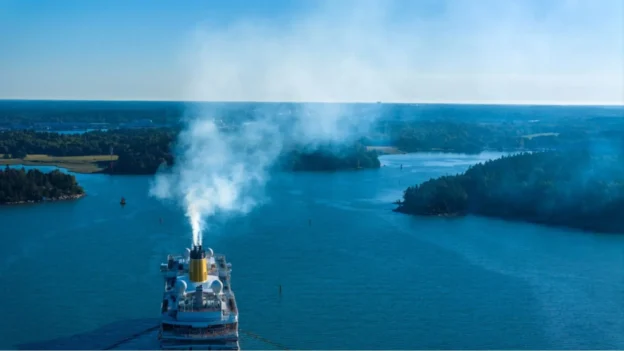The maritime emissions in the EU reached their highest levels in 2024 since mandatory registrations began in 2018. This is revealed in an analysis by the Transport & Environment (T&E) group, which highlights a 13% increase in CO₂ emissions, driven by longer routes due to geopolitical disruptions such as the conflict in the Red Sea.
EU maritime emissions driven by route deviations
Although overall trade was reduced, longer routes resulting from avoiding conflict zones increased fuel consumption and, with it, pollutant emissions. The
According to T&E, each percentage point increase in navigation speed can translate into up to 3% more emissions. This sensitivity is evidence that the operational pace of ships is a critical factor in the sector’s pollution.
ETS as a key tool
Currently, the EU Emissions Trading Scheme (ETS) already covers part of the maritime sector and has shown high levels of compliance in its first year. T&E believes that this mechanism should be extended to smaller vessels and strengthened to ensure that all polluters bear the cost of their emissions.
Agathe Peigney, head of shipping policy at T&E, warns that even in contexts of lower economic activity, logistical misalignments can lead to considerable increases in the sector’s climate footprint.
Pollution linked to fossil fuels persists
The analysis shows that ships engaged in the transport of fossil fuels fossil fuel transport account for 20% of total EU shipping emissions, a proportion that has not changed since 2018. Emissions from methane tankers have declined slightly after their peak following the Russian invasion of Ukraine, while those generated by the transport of crude oil remain at levels comparable to 2019.
MSC tops the list of the most polluting shipping companies, with 15.6 million tons of CO₂ emitted. Behind are the Grimaldi Group and the Carnival cruise company.
Decarbonization: a long way to go
T&E insists that eliminating dependence on fossil fuels would significantly reduce emissions, but there is still more than 80% to mitigate. Achieving a zero-emissions fleet will require not only operational efficiencies, but also technological transitions towards green fuelssuch as hydrogen.
The performance recorded in 2024 reaffirms that climate regulation in the maritime sector must be strengthened if Europe is to achieve its decarbonization goals.
Source: EU Ministry of Transport and Environment (T&E).
Photo: Shutterstock

